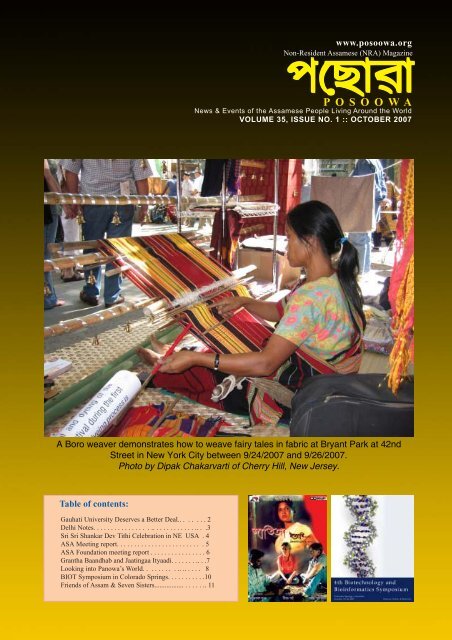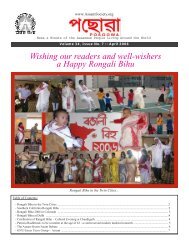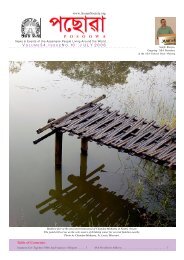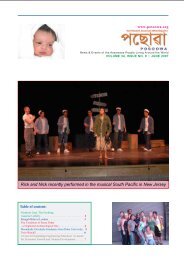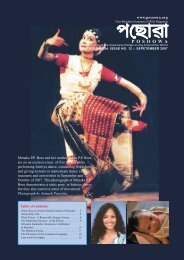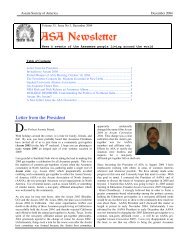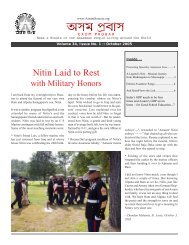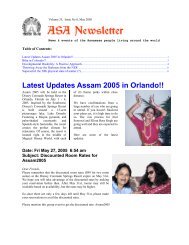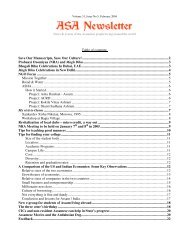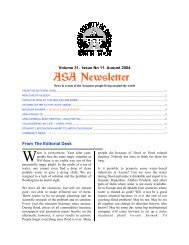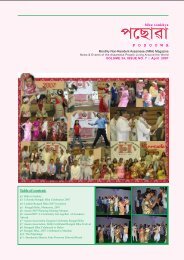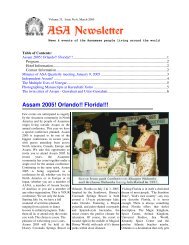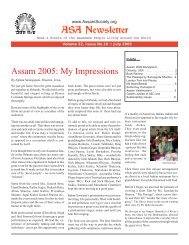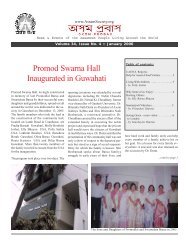Create successful ePaper yourself
Turn your PDF publications into a flip-book with our unique Google optimized e-Paper software.
www.posoowa.org<br />
Non-Resident <strong>peCawa</strong><br />
<strong>Assam</strong>ese (NRA) Magazine<br />
POSOOWA<br />
News & Events of the <strong>Assam</strong>ese People Living Around the World<br />
VOLUME 35, ISSUE NO. 1 :: OCTOBER 2007<br />
A Boro weaver demonstrates how to weave fairy tales in fabric at Bryant Park at 42nd<br />
Street in New York City between 9/24/2007 and 9/26/2007.<br />
Photo by Dipak Chakarvarti of Cherry Hill, New Jersey.<br />
Table of contents:<br />
Gauhati University Deserves a Better Deal.. . . . . . . 2<br />
Delhi Notes. . . . . . . . . . . . . . . . .. . . . . . . . . . . . .. . .3<br />
Sri Sri Shankar Dev Tithi Celebration in NE USA . 4<br />
ASA Meeting report. . . . . . . . . . . . . . . . . . . . . . . . . 5<br />
ASA Foundation meeting report . . . . . . . . . . . . . . . . 6<br />
Grantha Baandhab and Jaatingaa Ityaadi. . . . . . . .. . .7<br />
Looking into Panowa’s World. . . . . . . . . .. .. . . . . 8<br />
BIOT Symposium in Colorado Springs. . . . . . . . . . .10<br />
Friends of <strong>Assam</strong> & Seven Sisters................. . . . . . .. 11
Gauhati University<br />
Deserves a Better Deal<br />
The present Vice<br />
Chancellor and<br />
c h i e f<br />
administrative officer<br />
of Gauhati University,<br />
Dr. Amarjyoti<br />
Choudhury planned to<br />
resign during the last<br />
week of Septmber 2007, because he is<br />
unable to carry out his job under the<br />
circumstances prevailing at the University.<br />
The Governor of <strong>Assam</strong>, who is the formal<br />
Chancellor of the University, did not accept<br />
his resignation. I am not surprised!<br />
The Vice Chancellor of the University is<br />
finding himself in the midst of a sea of<br />
problems and is desperately looking for<br />
rescue. Appeals to the Government of <strong>Assam</strong><br />
for revival of the university have fallen on<br />
deaf ears. The politicians make tall promises<br />
but in practice nothing happens. To save the<br />
university from sinking to the bottom, the<br />
VC has extended his begging bowl to the<br />
NRAs (Non-resident <strong>Assam</strong>ese) like a<br />
drowning man clutching a single straw.<br />
This past summer when I was at Guwahati,<br />
I had an opportunity to listen to his<br />
emotional appeal to the public in a meeting<br />
titled “Save Our University”. Sitting next<br />
to him was Mamoni Baidew (Mamoni<br />
Raisom Goswami) who was also appealing<br />
on behalf of the University in the same tune<br />
saying “Our students are wonderful, bright<br />
and intelligent; they certainly need help and<br />
support”.<br />
The demand for converting GU into a<br />
Central University has been made for a long<br />
time. The conversion can cater to the needs<br />
of students in a much better way.<br />
Enhancement of the standard of the<br />
university will prevent brain drain of<br />
<strong>Assam</strong>ese students to a considerable extent,<br />
as a very large number of students go out of<br />
the state every year to pursue higher<br />
education. A revitalized university under<br />
competent and entrepreneurial leadership<br />
can create a center of higher education that<br />
can attract students from other South- East<br />
Asian countries also, in not too distant<br />
future.<br />
It is really sad to see the decaying condition<br />
of Gauhati University, and how negligence<br />
and misuse of the campus have led to such<br />
a degraded state. It seems that there are no<br />
sympathizers left to help this institution<br />
because the whole academic atmosphere has<br />
become so corrupted that money speaks<br />
louder than knowledge. The student<br />
community has become so used to the<br />
situation that they have no realization that<br />
they are the worst sufferers.<br />
Perennial financial crisis has retarded the<br />
progress of the premier university of the<br />
North-East region. It is unfortunate that the<br />
university which has contributed immensely<br />
in enriching the educational scene of the<br />
region is now crying hoarse for funds. This<br />
university has shaped the destiny of the<br />
significant section of <strong>Assam</strong>’s intelligensia<br />
and can boast of producing a large number<br />
of scholars and researchers who have made<br />
laudable contributions to the state. But its<br />
academic performance has fallen short of<br />
what is expected of a institution of its stature.<br />
Recently the university have come up with<br />
Rupees 180 crores (approximately $4.5<br />
million US) proposal for revamping its<br />
infrastructure. The reluctance of <strong>Assam</strong><br />
Government to invest in education is not<br />
surprising. But again it maybe that the<br />
university authorities in<br />
the past failed to exhibit<br />
the kind of leadership<br />
necessary for making its<br />
case strongly before the<br />
Government. With the<br />
state Government<br />
attitude being negative,<br />
the university has no<br />
other option left except<br />
to seek donation from<br />
the public and corporate<br />
houses. At the same<br />
time, it requires a<br />
Page 3 * POSOOWA, October 2007<br />
greater responsibility and dogged persuasion<br />
on the part of the university to convince the<br />
government that big investment is a must.<br />
The flippant attitude of those who are in the<br />
helm of affairs towards Gauhati University<br />
is causing great distress in the intellectual<br />
circles in <strong>Assam</strong> since GU is the mother of<br />
all institutions of higher education in <strong>Assam</strong>.<br />
This university deserves the treatment in<br />
<strong>Assam</strong> that the English has given to Oxford.<br />
As part of its initiative to tide over the crisis,<br />
the Vice Chancellor Dr. Amarjyoti<br />
Choudhury has taken some innovative steps.<br />
An account has been opened in the State<br />
Bank of India branch on the university<br />
campus for anyone to deposit much-needed<br />
and much-appreciated donations for the<br />
development of the university. Even the<br />
smallest amount one can afford to donate is<br />
welcome. Today we have many millionaires<br />
and possibly billionaires in <strong>Assam</strong>, but not<br />
many generous donors<br />
The key point is that is enough has been said,<br />
but what can we do Here are some<br />
suggestions:<br />
1) Like many colleges and universities<br />
around the world, the alumni of Gauhati<br />
University must come forward and<br />
contribute to the all round development of<br />
their alma mater.<br />
2) The alumni community of Gauhati<br />
University, wherever they are in the globe,<br />
must organize themselves, and undertake<br />
relevant programs through institutions they<br />
are associated with. Funds can possibly be<br />
raised through overseas students unions and<br />
political parties like the Labour League of<br />
Friends in UK.<br />
3) There are various international charitable<br />
societies known for their focus on<br />
educational causes. If they can be<br />
approached with the plight of the Gauhati<br />
University, it may bring some financial<br />
relief.<br />
The involvement of its alumni and the<br />
people of <strong>Assam</strong> and <strong>Assam</strong>’s diaspora<br />
around the world is absolutely crucial to help<br />
the university overcome its current crisis and<br />
embark on new plans and projects. Recently,<br />
a lady came forward to donate her life notso-large<br />
savings to help the present VC in<br />
his quest. Her selfless example drives home<br />
the point that the challenge in front of us all<br />
is to make it a common cause to help Gauhati<br />
University rise to our lofty expectations so<br />
that it can work hard not only to re-attain its<br />
past glory but also to attain new heights.<br />
Rini Kakati, London<br />
October 1, 2007
Delhi Notes<br />
Athree day National Seminar<br />
on Tribes of India with<br />
Special Focus on Karbis of<br />
<strong>Assam</strong> (September 5 to September 7,<br />
2007) was held at University of Delhi,<br />
jointly organized by the Department of<br />
Manjeet Baruah, speaking<br />
on the occasion<br />
Modern Indian Languages and Literary<br />
Studies, University of Delhi and Karbi<br />
Anglong Zila Sakharata Abhijan Samiti.<br />
The seminar was inaugurated by Prof<br />
Indira Goswami (Mamoni Raisom<br />
Goswami) who was also the Chief Guest<br />
on the occasion. The seminar was the<br />
first that had brought the Karbi people<br />
to the centre stage of discussion at the<br />
national level. The organizers<br />
emphasized that the seminar was a<br />
success in another way as well. It was<br />
collaboration between two institutions,<br />
one operating at the level of higher<br />
education in the national capital of Delhi<br />
and the other that has been successfully<br />
engaged in adult literacy in Karbi<br />
Anglong, <strong>Assam</strong>. Today, Karbi Anglong<br />
is among two of the most successful<br />
districts in India in the field of adult<br />
literacy. It is collaboration of this nature<br />
that makes education more meaningful<br />
in a country where there is a constant<br />
gap between higher education and<br />
primary literacy and a gap between the<br />
centre and the distant regions of the<br />
country. The scholars who participated<br />
in the seminar came from various<br />
disciplines such as Sociology, History,<br />
Anthropology, Social Work, Folklore,<br />
Culture Studies, Music and Performing<br />
Art and Literature. They came from<br />
Universities and research organizations<br />
spread all over the country. Another high<br />
point of the seminar was the published<br />
volume Tribes of India: Culture, Identity<br />
and Lore, edited by Dr. P. Pattanaik and<br />
Shri Debojit Bora. The volume<br />
contained all the papers that were<br />
presented during the seminar. The<br />
participants were given a copy of the<br />
volume during the seminar. The seminar<br />
concluded on a positive note, with the<br />
participants and guests congratulating<br />
the organizing team and on the note that<br />
more such collaborative ventures should<br />
be initiated to bring into focus areas,<br />
people and issues that have been understudied<br />
in academic discourses.<br />
Review of Book: Pattanaik, P. and<br />
Bora D. (ed.), 2007. Tribes of India:<br />
Culture, Identity and Lore, Guwahati:<br />
Angik Publication.<br />
Page 3 * POSOOWA, October 2007<br />
The beautiful cover of the book is<br />
matched by its authoritative survey of<br />
tribal society in India with a special<br />
focus on the Karbi people of <strong>Assam</strong>.<br />
The essays include theoretical<br />
expositions on the issue of ‘tribal’<br />
culture and identity as well as on how<br />
these categories operate at the<br />
functional level. Any concept operates<br />
at both ideological and functional<br />
level. The essays in the book<br />
insightfully bring into focus the<br />
dialectics of the twin operations. Some<br />
of significant questions that the<br />
volume raises are (a) rethinking<br />
‘tribal’ epistemology in India with<br />
emphasis on North East India, (b) the<br />
concept and politics of ‘tribe’ in India<br />
with emphasis on North East India, (c)<br />
problems in documenting and<br />
preserving ‘tribal’ culture, (d) tradition<br />
and social change among tribal<br />
women, (e) Social Science disciplines<br />
and the problematic of ‘tribal’ study<br />
and (f) Tribal people and Art. One<br />
noteworthy point in the volume is that<br />
it includes several essays on the Karbi<br />
people and these essays can be read<br />
in the light of the other essays for a<br />
better understanding of the Karbi<br />
people of <strong>Assam</strong>. It is to the success<br />
of the book that it enables not only an<br />
understanding of a people or a region<br />
and of the ways to conceptualize them<br />
through the existing knowledge<br />
paradigms but also the limitations of<br />
these knowledge paradigms and<br />
possible methods to overcome them.<br />
A recommended volume for research<br />
scholars.<br />
By Manjeet Baruah, University of<br />
Delhi
Sri Sri Shankar Dev Tithi<br />
Celebration in NE USA<br />
Sri Sri Shankar Dev Tithi celebration is a yearly regular event<br />
in the Northeast US. Like other years, the <strong>Assam</strong>ese community<br />
of the Northeast and the Mid-Atlantic states came together<br />
to celebrate and honor our Mahapurush Sri Sri Shankar Dev<br />
on 29th September, 2007. With everyone’s active participation,<br />
it was a great success! Thanks to all for your support for<br />
such community events that bring the <strong>Assam</strong>ese people together<br />
from various neighboring states.<br />
We take this opportunity to thank the family of Shonit and<br />
With compliments<br />
of the Das Family:<br />
Dhruba, Susan<br />
and Elora (standing),<br />
Rupam and Ronju<br />
(in front),<br />
of Coatesville,<br />
Pennsylvania, USA<br />
Kamna Das who sponsored the entire Tithi. A special dedication<br />
was given at the "naam" by Mr. Brojen Bordoloi.<br />
Our prayers are with the Das family and wish them all the<br />
best.<br />
Also many thanks to the organizers for their dedications<br />
and all the people who showed up bringing many delicious<br />
food and help clean afterward.<br />
By Dhruba Das<br />
Advertise @ Posoowa<br />
Posoowa provides opportunities for commercial<br />
or non-commercial advertisement that<br />
reaches the global <strong>Assam</strong>ese community. We<br />
seek advertisements so that we can keep<br />
bringing Posoowa to you every month.<br />
Please contact jugalkalita@yahoo.com<br />
for rates.<br />
Page 4 * POSOOWA, October 2007
Highlights from ASA’s<br />
October 14, 2007 Meeting<br />
Present: Members of the Executive<br />
Committee, and other members of<br />
ASA; conference organized<br />
telephonically<br />
Joint get together for all <strong>Assam</strong>ese people<br />
in 2008:<br />
The subject of holding the yearly get<br />
together of the <strong>Assam</strong>ese people in USA on<br />
the same day but separately is always<br />
questioned by many community members<br />
and also by many younger ASA members.<br />
This was discussed thoroughly in the<br />
meeting and even though it’s a little late to<br />
have a joint get together for next year,<br />
nevertheless the group felt we should always<br />
encourage this kind of discussion. ASA as<br />
a rule does believe in one joint get together<br />
for all the people. A couple of<br />
representatives on behalf of ASA will<br />
explore with appropriate member(s) from<br />
AANA to see if there is any possibility of<br />
holding the event together next year and<br />
under what circumstances.<br />
Remember we have had these joint gettogethers<br />
several times in the past after some<br />
great effort by many; so it’s not utterly<br />
impossible to do it again. We believe people<br />
in general enjoy very much for being able<br />
to meet a much bigger crowed. We hope<br />
AANA will entertain this request and<br />
something positive will come out!<br />
Charitable Projects:<br />
ASA has several charitable projects where<br />
ASA helps various needy groups in <strong>Assam</strong>.<br />
However lately other than one or two<br />
projects, nothing has been done much on the<br />
other projects. The question was brought<br />
up: should we identify one or two projects<br />
for the current year and at least try to do<br />
something real meaningful Are the project<br />
leaders still interested in running the<br />
projects The group felt as long as we do<br />
something, its good for <strong>Assam</strong>; half bread<br />
is better than no bread. We will identify two<br />
projects (with a majority consensus) and try<br />
to raise some substantial dollars by July next<br />
year.<br />
Membership:<br />
Except for a few folks, ASA members<br />
haven’t renewed their membership for the<br />
current year. Membership forms were<br />
included in the ASA directories. In the<br />
current year, ASA has spent more dollars<br />
than what it received. The ASA Treasurer<br />
promised to mail out additional requests to<br />
members for renewal of membership and<br />
donation. Please do support this effort.<br />
We not only need your support by renewing<br />
the membership but by also being active in<br />
a project or taking part in regional gettogethers<br />
such as Sankar Dev Tithi, and<br />
Bihus. It’s your organization and without<br />
your help and support we can’t survive as a<br />
group.<br />
Submitted respectfully,<br />
Dhruba Das, President<br />
Grantha Baandhab<br />
and Jaatingaa Ityaadi<br />
continued from page 7..<br />
e) To establish the biggest book showroom<br />
of North East India at Guwahati<br />
f) To set up a print and electronic media<br />
house and to project <strong>Assam</strong> and North East<br />
India correctly and professionally.<br />
I wish Mr. Sanjib Sabhapandit and Mr.<br />
Rajkamal Bhuyan the very best in this<br />
endeavor. I am also crafting below a short<br />
introduction of Sabhapandit and Bhuyan.<br />
Interested readers may contact and<br />
communicate to buy the movie and also<br />
support ‘GRANTHA BAANDHAB’.<br />
Sanjib Sabhapandit, born in 1957, is a<br />
mechanical engineer and an MBA. An<br />
entrepreneur, who has always treaded paths<br />
of his own choice, has been instrumental in<br />
establishment of industries and academic<br />
institutions in <strong>Assam</strong>. An author of two<br />
books, he conceptualized and enacted the<br />
first Light and Sound show of the North East<br />
India. The engineer in him designed a unique<br />
humane mode of transport of<br />
goats in the city of Guwahati,<br />
<strong>Assam</strong>. Mother Shelter, an allin-one<br />
flood relief camp<br />
capsule and a three-wheeler<br />
rickshaw with a humane touch,<br />
are two of his other<br />
innovations. The sensitivity in<br />
him led to the world of cinema,<br />
and his maiden film “JUYE<br />
POORA XOON” won the<br />
National Award (for best film<br />
on environment conservation<br />
and preservation) in 2004. In his second film<br />
“ JAATINGAA et al…” he has portrayed a<br />
love story, set in the extremist infested<br />
turmoil of the North East India in a forthright<br />
yet poignant way. This film has been<br />
nominated for the Indian panorama 2007.<br />
His contact information is Phone:<br />
09864044470, and E-mail:<br />
kuhkhal@yahoo.com.<br />
Rajkamal Bhuyan, a post graduate in<br />
Economics and a Chartered Accountant by<br />
profession, is the founder director of Liv’in<br />
Apartments (P) Ltd, a pioneering Real Estate<br />
company of the North East India. He is also<br />
a founder director of Four Seasons Garden<br />
Resorts (P) Ltd, engaged in constructing<br />
Page 5 * POSOOWA, October 2007<br />
North East India’s first Water park and a<br />
resort hotel in Guwahati and a theme holiday<br />
resort in Kaziranga. Ruchira Arts (P) Ltd,<br />
which is promoted by him, is engaged in<br />
audio visual productions, book publishing,<br />
and strives to contribute meaningfully to art<br />
& culture of the region. Jaatingaa et al… is<br />
the maiden venture of the company, and the<br />
company is now actively engaged in several<br />
cultural, literary and media projects. A<br />
Rotarian, Sri Bhuyan, is the spirit behind<br />
the noble road map of Ruchira Arts. His<br />
contact information is Phone: 09435013943<br />
and E-mail: brajkamal@hotmail.com.<br />
By Ankur Bora, Texas
ASA Foundation, Inc.,<br />
Meeting Minutes<br />
Date: 10/21/2007. Venue:<br />
Teleconference<br />
Attendees: Nomal Dutta, Jugal Kalita,<br />
Utpal Brahma, Jayantha Thakuria and<br />
Mukul Chowdhary<br />
Key points Discussed:<br />
1. The central focus was on disbursement<br />
of the money raised for various social<br />
projects in <strong>Assam</strong>, India during the<br />
annual <strong>Assam</strong>ese Conference (<strong>Assam</strong><br />
2007) held on Washington DC, Maryland<br />
during June 30-July 1. Nomal Dutta<br />
mentioned that donations were received<br />
from attendees against the following<br />
causes Parijat Academy (solicited by<br />
Partho Gogoi), Pragyalaya (solicited by<br />
Ankur Bora), Hope Project (an old ASA<br />
project which was initiated by Malabika<br />
Bora Brahma), Flood Relief (A Core ASA<br />
Foundation project).<br />
Thank You!<br />
Dear friends,<br />
2. The members unanimously agreed that<br />
while the raised fund is to be used for the<br />
purpose it was contributed by the<br />
generous community members, for the<br />
purpose of book-keeping and compliance<br />
against the IRS guidelines (which a tax<br />
exempt organization like ASA<br />
Foundation is bound by law to comply<br />
with), the foundation must receive the<br />
legal and tax status of the recipient<br />
organization (in this case Parijat<br />
Academy and Pragyalaya) as applicable<br />
in the country (in this case India) where<br />
it operates before the fund can be<br />
disbursed.<br />
3. Utpal Brahma will contact Parijat<br />
Academy and Pragyalaya directly to seek<br />
the pertinent legal and tax status of these<br />
organizations as applicable in the country<br />
where it functions (India)<br />
5. Mukul Chowdhary and Nomal Dutta<br />
28 October, 2007<br />
bouncing back rapidly.<br />
will provide input to Utpal Brahma with<br />
respect to the exact information which<br />
will be required from these organizations<br />
before money can be disbursed to them.<br />
To make our effort more meaningful and<br />
effective, it was decided that<br />
a. A teleconference call involving AFNA<br />
members (which will invoke joint effort<br />
between ASA Foundation and AFNA for<br />
projects relating to <strong>Assam</strong>) and well<br />
wishers within the community will be a<br />
good starting point.<br />
b. Seek the help of professional fund<br />
raising bodies to raise funds from<br />
<strong>Assam</strong>ese and non-<strong>Assam</strong>ese residents in<br />
the US for projects in <strong>Assam</strong>. Nomal<br />
Dutta volunteered to work with Dr. Sanjiv<br />
Bhuyan regarding this initiative.<br />
Utpal Brahma<br />
We would like to thank you all for your concerns and<br />
deeply appreciate your phone calls and messages.<br />
During the recent fires in San Diego, the local <strong>Assam</strong>ese<br />
families have received many phone calls and emails from<br />
their concerned friends from all parts of the country.<br />
We are happy to inform everyone that none of the<br />
<strong>Assam</strong>ese families have been directly affected. Most of<br />
us were evacuated from our homes for several days, but<br />
no one lost their home. The fires gutted over 1,500 homes<br />
and 7 lives were lost in these fires. However, the morale<br />
of the people of San Diego remains high and we are<br />
Sincerely,<br />
Arup Barua<br />
Bhaskar & Kaju Borthakur<br />
Arindam & Rita Kataky<br />
Kaushik & Rashmi Kalita<br />
Bimal & Ruli Deka<br />
Rabin & Kalpana Sarma<br />
Panna & Loni Hazarika<br />
News from Colorado<br />
<strong>Assam</strong>ese residents of Colorado<br />
celebrated Sankardev Tith, Durga<br />
Puja, Lakhmi Puja and Dewali in<br />
Fort Collins with a fun-filled<br />
evening.<br />
Photo by Bharat Baruah<br />
Page 6 * POSOOWA, October 2007
Grantha Baandhab<br />
and Jaatingaa Ityaadi<br />
The state of <strong>Assam</strong> is<br />
in deep distress and<br />
great disorder.<br />
Insurgency, terror<br />
and rampant<br />
corruption have created<br />
such a situation that common men are<br />
almost losing hope for a better tomorrow.<br />
The vicious cycle of unemployment causing<br />
insurgency and insurgency in turn causing<br />
instability has left our youth weary and<br />
frazzled.<br />
Despite such a hopeless and chaotic<br />
situation, we still come across men and<br />
women who are making a significant<br />
difference in peoples’ lives. They, with their<br />
creativity, vision and will power have<br />
proved that there still exists light at the end<br />
of the tunnel. Sanjeev Sabhapandit is such<br />
a filmmaker, social worker and<br />
philanthropist who believes that an artist too<br />
is committed to the wellbeing of society.<br />
Sabhapandit through his award winning film<br />
titled ‘Jaatingaa Ityaadi’ has brought forth<br />
his concern about the maladies of society.<br />
At the same time he has made a conscious<br />
effort to arrest the downward trend of our<br />
moral ethos and to create a positive<br />
ambiance in our troubled state with creative<br />
ideas and innovative schemes. He has<br />
started ‘GRANTHA BAANDHAB’ (a book<br />
lovers club) to promote and inculcate<br />
reading habits among the young and old<br />
alike and thereby help build the intellectual<br />
crest of our society.<br />
His movie ‘Jaatingaa Ityaadi’ is a sincere<br />
and honest attempt to portray the anguish<br />
and suffering brought by deadly insurgency<br />
to our people. The film’s protagonist Manab,<br />
an educated youth, is appalled by everyday<br />
corruption and general apathy in society.<br />
Demoralized and frustrated, he goes back<br />
to his native village and joins hands with a<br />
group of insurgents pledging to cure the ills<br />
of society through the deceptive path of<br />
insurgency. However, he soon realizes that<br />
insurgency has nothing to do with his<br />
dreams of uplifting a frail and feeble society.<br />
It is a masquerade, a disguise that the<br />
militants were using in running an extortion<br />
racket in the garb of fighting for a social<br />
cause. He tries to escape, but the escape<br />
route is thorny. Like many others, he too<br />
becomes a prisoner of insurgency; trapped<br />
and hence an involuntary accomplice.<br />
‘Jaatingaa Ityaadi’ is a poignant depiction<br />
of insurgency and its devastating impact on<br />
hundreds of families. Mr. Sabhapandit<br />
skillfully shows how insurgency emerged<br />
as the hydra for the state’s society. In NC<br />
Hills district there is a hill station called<br />
Jatinga where according to legend migratory<br />
birds come to commit mass suicide. The<br />
facts however are that local hunters use<br />
petromax lamps at night to lure and trap<br />
these birds. As I completed watching the<br />
movie, I felt that the title of the movie<br />
‘Jaatingaa’ is a metaphor. Like the helpless<br />
birds, our youths have also been trapped in<br />
insurgency and its subsequent deathlike<br />
stagnation.<br />
Sanjeev Sabhapandit is not only a filmmaker<br />
and artist but also a committed individual<br />
who has been trying hard for the intellectual<br />
growth of the <strong>Assam</strong>ese youth. Mr.<br />
Sabhapandit has been aptly supported by<br />
Mr. Rajkamal Bhuyan who is the producer<br />
and financer of ‘Jaatingaa Ityaadi’. Both<br />
Sabhapandit and Bhuyan together have<br />
started a literary movement titled<br />
‘GRANTHA BAANDHAB’. This is to<br />
arrest the downward fall of our socio<br />
Page 7 * POSOOWA, October 2007<br />
cultural atmosphere. The last few decades<br />
have been traumatic for the people of<br />
<strong>Assam</strong>. The six years long <strong>Assam</strong><br />
Movement, the miserable failure of the<br />
student leadership and subsequent<br />
emergence of insurgency have mentally<br />
crippled <strong>Assam</strong>’s future generation. The<br />
‘GRANTHA BAANDHAB’ is a bold and<br />
sincere attempt to guide our youths through<br />
the ruins. Books are our treasure house and<br />
book reading is a habit and practice that<br />
enlightens us with all the treasures that lay<br />
hidden for us to explore and understand. I<br />
have observed that in the United States<br />
people spend a lot of time reading books<br />
and highly emphasize the value of book<br />
reading. Oprah Winfrey, the famous<br />
television host of “The Oprah Winfrey<br />
Show” has a book club and books<br />
recommended by the club usually sell in<br />
millions. Oprah Winfrey’s book club is a<br />
movement which has a deep positive impact<br />
in many peoples’ lives. Sanjeev Sabhapandit<br />
and Rajkamal Bhuyan through their dream<br />
project GRANTHA BAANDHAB hope that<br />
their movement too will create a positive<br />
outcome in the coming days. The salient<br />
features of the project are:<br />
a) A target to create a readership base of 5<br />
lakhs in 300 days from the date of launch<br />
of the website. The website<br />
www.ruchiraarts.com is operational now.<br />
b) To upload all available books from and<br />
on or about North East India in a website<br />
and make those available for sale.<br />
c) To create a direct book marketing network<br />
through a select band of about 350 youths<br />
scattered all over the region initially who<br />
are being named Mission Associates.<br />
d) Publication of a regular monthly journal<br />
exclusively to update the book publication<br />
front.<br />
continuted to page 5...
Looking into<br />
Panowa’s World<br />
My dear brother Nantu who is<br />
interested in ordinary people<br />
and how they live got more<br />
than interested in a person whom we<br />
would not even notice in our midst. He<br />
discovered some down-to-earth facets<br />
of the man’s character and told me a<br />
whole lot about him – a lot more than I<br />
could assimilate in my early youth. But,<br />
what my brother told me stayed on my<br />
mind vividly for many decades. The<br />
man’s name was Panowa who made his<br />
living like many of his working-class<br />
community did at a tea stall in Gauripur<br />
market. My brother made the discovery<br />
of the lovable man during his visits to<br />
the tea-stall. You would see that Panowa<br />
was man of conscience and a pillar of<br />
strength in the face of enormous multidimensional<br />
adversity.<br />
I had seen Panowa on many occasions<br />
standing at the corner of a pan-shop<br />
smoking bidi and listening to others,<br />
while he hardly doing any talking. He<br />
had long curly hair which came up to<br />
his shoulder, and unkempt beard. His<br />
clothes were always dirty. He wore a<br />
pair of sandals made out of discarded<br />
automobile tires by an enterprising<br />
cobbler. He did not talk much except<br />
when necessary. But, he was a nice<br />
lovable person. Nonetheless, he stood<br />
out as a defiant non-practitioner of<br />
normal hygiene and cleanliness in daily<br />
living. And people loved that aspect of<br />
him simply as a point of reference when<br />
talking about degree of cleanliness and<br />
shabbiness of people in the town.<br />
Paniwa-10 was the highest one could<br />
get, not any higher. He knew that. But,<br />
that didn’t bother him a whit. Because,<br />
there was a compensating skill in him<br />
and he was absolutely sure of that – he<br />
made excellent spicy ‘singaras’, the best<br />
in town in all seasons of the year for<br />
many years going. And the people had<br />
been lapping his singaras up for years<br />
in spite of his widespread reputation of<br />
uncleanliness, in attire to be sure.<br />
He lived just on the edge of the town<br />
with his old mother sharing a single tinroofed<br />
shack with some mango trees in<br />
the small yard and couple of milk cows<br />
which his mother depended on as her<br />
income. He didn’t have any family of<br />
his own – he never married in his thirty<br />
five years of his uneventful life when I<br />
came to know about him. The owner of<br />
the tea stall where he worked left him<br />
alone to do his own things which he did<br />
well. So, he was his own boss at the tea<br />
stall and he loved that freedom of doing<br />
things as he liked. It gave him a measure<br />
of self worth and meaning. His mother<br />
asked him often to get a wife so that she<br />
could die in peace when her time came.<br />
He kept silent whenever the matter came<br />
up. But, she got on his nerves by<br />
repeating the same thing again and<br />
again. Finally, being able to stand her<br />
pestering no more, he exploded in<br />
uncontrollable rage as much as a rebuke<br />
to his mother as to his own situation in<br />
life, “Khach, khach. Buddi, the old<br />
irritating lady, you have seen nothing<br />
but poverty in all your life. You were<br />
born in poverty; you lived your life in<br />
grinding poverty. You want to die in<br />
peace so that many more could be born<br />
in more poverty. Remember, when your<br />
daughter comes to see you, you can’t<br />
provide her and her children even with<br />
something to eat.” and stormed out of<br />
the shack. The inner space for comfort,<br />
security and solace he built for himself<br />
over many years of his adult life was<br />
being penetrated by none other than his<br />
own loving mother and there was no<br />
excuse for that, he argued.<br />
After his outburst of anger, he moved<br />
into a back room of the tea stall for some<br />
time. At the end, he was repentant for<br />
his rude behavior and cried in the<br />
presence of roomful of customers when<br />
he was asked why he lived in the tea<br />
stall instead of his house. He came<br />
home, looked at his mother and cried<br />
again. The old lady didn’t raise the<br />
question again about his marriage or<br />
anything else. But, when Panowa was<br />
Page 8 * POSOOWA, October 2007<br />
not home, she just complained to others<br />
in the neighborhood at the top of voice<br />
about his son’s rude behavior and errant<br />
ways of life without a wife while<br />
sweeping her already-swept yard. Not<br />
venting her displeasure would send a<br />
wrong message to her neighbors and she<br />
did not want that. She would not let a<br />
dead leaf from the mango trees stay in<br />
the small yard for long. That was her<br />
own way of copying with the harshness<br />
of a changing way of life for his son<br />
without being married. Every one else<br />
she knew was married when they came<br />
of age at fifteen or sixteen or even<br />
earlier. That was the natural law as<br />
enunciated by her religion. She could<br />
not understand why his son didn’t<br />
understand the simple thing.<br />
Panowa did his daily duties unerringly<br />
and with great devotion and precision<br />
and regularity. He never willingly<br />
missed his work. The first thing he did<br />
in the morning after getting up was<br />
lighting up a bidi and taking long<br />
leisurely puffs while in deep thoughts<br />
about what specialty of singaras he<br />
should make that day to keep his<br />
customers happy and coming back to his<br />
tea stall. Without that he would be<br />
unemployed and that would be a<br />
disaster. That brief interlude being over,<br />
he would take a stroll to a nearby bush<br />
by the river with a shinny multi-purpose<br />
metal container with a long spigot filled<br />
with water from their water-well to do<br />
his usual natural things. The bush was<br />
the communal lavatory used by both<br />
males and females with a simple code<br />
of conduce – no male would use the<br />
bush when a female was there. After<br />
coming back from the bush, he splashed<br />
fresh water drawn from the same well<br />
on his face and cleaned his water<br />
container with sand and a piece of<br />
coconut husk to give it a shiny clean<br />
gloss. He would that again for drinking<br />
water. He put on his lone shirt. He did<br />
not change any other clothes because he<br />
did not care to have any at the beginning<br />
of his adult life when his father was alive<br />
and took care of his family as best as he<br />
could, and now couldn’t afford to have<br />
any. It was kind of minimalist view of<br />
necessary things of life born out of After<br />
taking a bath in the river, he would come<br />
home with a new sari which he bought<br />
for his mother along with his lungi.<br />
Without giving the sari to his mother,<br />
he would lay it on his mother’s barren
wooden cot. Making sure that his<br />
mother was not anywhere near, he<br />
would stand before a big picture of<br />
goddess Durga, the goddess of destroyer<br />
of peoples’ misery, the picture that he<br />
hung up years ago on the wall of his<br />
shack after obtaining that picture from<br />
a Bidi manufacturer. He would put a few<br />
sticks of incense into the mud floor<br />
before the picture and light them up. He<br />
would murmur a few words in memory<br />
of his father. Panowa thought up the<br />
whole simple ritual one night many<br />
years after his father’s death when he<br />
was heading home after work thinking<br />
about his father, mother and little sister.<br />
His father was an honest and hardworking<br />
man trying to provide for<br />
himself, his wife, Panowa and his little<br />
sister Panchali. His father sold roasted<br />
peanuts, spicy cooked unshelled gram<br />
lentil and ‘chanachur’, all made in his<br />
shack, out of a small glass-enclosed box<br />
in a corner of the market on ‘marketdays’<br />
and roamed around in surrounding<br />
villages the rest of the week. He carried<br />
that box on his head cushioned by his<br />
gamcha wrapped like a ring, and a light<br />
wooden support on his back to prop up<br />
the box when he reached a destination.<br />
When it rained, he was out of an income<br />
and they all sort of starved. Mangoes,<br />
which they could not sell, provided<br />
some relief in the season. His mother<br />
hardly slept at night when mangoes<br />
ripened. She went out to collect<br />
mangoes when she heard a thud of<br />
falling mangoes in her yard. The meaty<br />
yellow mangoes were easy targets for<br />
early-rising neighborhood boys who<br />
were always on the lookout for<br />
something to eat. And stealing mangoes<br />
added an extra edge to their desire. For<br />
Panowa’s family, mangoes were a<br />
precious commodity for the family’s<br />
survival in the lean rainy months. But,<br />
Panowa did not want deprive the boys<br />
entirely. In the years when he helped his<br />
father in roasting peanuts, cooking<br />
lentils and doing other things for his<br />
vending business, he was home most of<br />
the day. Taking advantage of his<br />
mother’s absence from the shack when<br />
she took their cows for grazing around<br />
the nearby school yard, Panowa called<br />
the neighborhood boys to their yard. He<br />
would climb up on a tree, selectively<br />
shook branches high up on the tree so<br />
that his mother’s squinting eyes didn’t<br />
miss those mangoes in her estimation<br />
of what she had. Then he gathered the<br />
fallen mangoes and distributed them<br />
among the boys delighting them all. His<br />
father looked the other way all<br />
throughout the whole clandestine<br />
operation. The boys affectionately<br />
called him Panowabhai, brother<br />
Panowa. As a reciprocal gesture of<br />
good-will towards him, they followed<br />
him silently up to their side of the culvert<br />
over the drainage ditch as Panowa came<br />
out of his shack and headed to the<br />
market. Panowa, maintaining his stoic<br />
silence, never exchanged a word with<br />
them. He didn’t want to be their role<br />
model.<br />
If a sense of heart-felt solemnity graced<br />
the observance of Panowa’s father’s<br />
death anniversary, a sense of merriment<br />
and revelry marked the observance of<br />
the ‘holi’ festival. On that day he also<br />
had a hair cut, a shave, an elaborate bath<br />
in the river duly observed by a crowd<br />
of children, wear new clothes he bought<br />
for himself, and he gave a sari to his<br />
mother the usual way. After the bath, he<br />
would head straight to market to buy<br />
meat, a commodity which escaped his<br />
meals for most of the year, for himself<br />
and his colleagues at the tea-stall. The<br />
he would elaborately cook meals for<br />
them all including the owner. The meal<br />
was on him. A few drinks of strong<br />
country liquor and a good meal would<br />
prepare him and his friends for a nightlong<br />
merriment and revelry. They<br />
wrapped their heads with ‘gamchas’,<br />
they would take out their ‘dholocks’,<br />
heavy brass-metal ‘khanjaris’ and little<br />
cloth pouches called ‘khotuas’ to hold<br />
abirs and buy red-colored fine talcum<br />
‘abir’ to smear themselves and others<br />
who happened to be by. They would sing<br />
songs of extreme sexual fantasy and<br />
dance in circles in a frenzied spirit of<br />
liberation. They challenged onlookers to<br />
join in their fun and many did. There<br />
www.<strong>Assam</strong>Times.org<br />
Page 9 * POSOOWA, October 2007<br />
was no boss, no class, no babus – all<br />
barriers came down. The revelers, their<br />
individual beings lost under liberal<br />
sprinkles and smears of ‘abirs’ and their<br />
inhibitions unburdened of any pretense,<br />
were joined by other revelers of the<br />
same make-up and spirit, and few<br />
‘hijras’ added some spice to the festive<br />
spirit. The air would be filled with fullthroated<br />
expressions of joy punctuated<br />
with ‘chara rara, chara rara, rara rara,<br />
rara rara…’ This was their day and they<br />
would make full use of it. And they did.<br />
They would go to the homes of people<br />
they liked and smeared the men with<br />
plenty of abirs and teased the<br />
womenfolk of their beauty and coyness<br />
in songs – all in fun and good spirit.<br />
When the revelry ended late in the<br />
morning, they revelers were too<br />
exhausted to go home. They slept<br />
wherever they rested. Some found a<br />
secluded corner by themselves to get<br />
warmth and affection.<br />
Panowa would get up and go home. He<br />
had a job to do. Coming home, he would<br />
fill his lota with water and start his daily<br />
routine in the bush. But, he would not<br />
let go of the intoxicating flavor of the<br />
‘Holi’ festivities of the night before. He<br />
would splash his face with cold water.<br />
But, he would not take a bath nor would<br />
change his clothes. If it was fine with<br />
Panowa, it was fine with people.<br />
Some of the abirs from his hair, beard<br />
and clothes would fall off, and the rest<br />
would gradually be buried under layers<br />
of sweat, dust, grime and soot from the<br />
oven till it was time for Panowa to take<br />
hair cut, a shave, a bath and a set of new<br />
clothes to begin the cycle of his<br />
mundane life again.<br />
By Kalyan Dutta-Choudhury<br />
San Francisco<br />
<strong>Assam</strong> Times, an online news portal, is looking<br />
for dynamic people in every nook and<br />
corner of <strong>Assam</strong> as well as outside <strong>Assam</strong>as<br />
reporter/writer. Please send your news/articles/photograhs<br />
for publications to:<br />
editor@assamtimes.org. New reporters/<br />
writers, please send your one small picture<br />
and your biodata with contact information.
BIOT Symposium in<br />
Colorado Springs<br />
The Fourth Biotechnology and<br />
Bioinformatics Symposium,<br />
2007 (BIOT-07) was held on the<br />
campus of the University of Colorado<br />
at Colorado Springs (UCCS) on October<br />
19th and 20th, 2007. This year’s<br />
symposium was a great success.<br />
Jugal Kalita, a professor in the<br />
Department of Computer Science at<br />
UCCS is the founder of this yearly<br />
symposium and was a Co-Chair of this<br />
year’s symposium. The small<br />
symposium started in Colorado Springs<br />
four years ago as a local event, then<br />
became regional and is transitioning to<br />
become national. The venues for the<br />
symposium during the past four years<br />
have been UCCS (years 1 and 2),<br />
Brigham Young University, Provo Utah<br />
(year 3), and UCCS (year 4). In 2008, it<br />
will be held in University of Texas at<br />
Arlington. In 2009, the Steering<br />
Committee for the symposium accepted<br />
a site proposal from the University of<br />
Nebraska at Lincoln.<br />
This year symposium featured 20 fully<br />
reviewed papers from across the US and<br />
abroad. Each paper was reviewed by 3-<br />
5 referees from an international panel<br />
of scientists. The symposium had four<br />
invited speakers including one from the<br />
National Institutes of Health. In<br />
summary, there were 28 presentations<br />
over two days by individuals from<br />
almost 20 different institutions<br />
including one each from India and Italy.<br />
The acceptance rate of papers for the<br />
symposium has varied between 33% and<br />
67% during the past four years. Selected<br />
papers from this year’s symposium will<br />
be revised and published in the<br />
International Journal of Bioinformatics<br />
Research and Applications. Jugal Kalita<br />
Cover for the proceedings of the 4th<br />
Biotechnology and Bioinformatics<br />
Symposium, designed by Gayatree<br />
Buragohain of New Delhi<br />
will serve as the Guest Editor for this<br />
special issue of the journal.<br />
The Web site for the symposium is<br />
www.biotconf.org. Gayatree<br />
Buragohain of New Delhi designed the<br />
cover for this year’s proceedings.<br />
By Babul Gogoi, New Delhi<br />
<strong>Assam</strong> Convention 2007<br />
Chorus Competition<br />
Texas team won the first prize in Anima Chakravarty Chorus Competition held in<br />
<strong>Assam</strong> Convention 2007, Boston, photo by Mano Hazarika, Sugar Land, Texas<br />
Page 10 * POSOOWA, October 2007
FASS Health Camp<br />
Ahealth camp was successfully organized<br />
on 9-23-07 at Parijat Academy, Pamohi<br />
Guwahati. About 50 patients from nearby<br />
area attended the camp. Three doctors from<br />
Guwahati offered their valuable service at the<br />
camp. They were Dr. Nripendra Nath Baruah,<br />
former Medical Superintendent, Central Hospital,<br />
NF Railway, Maligaon, Guwahati; Dr. Pranab<br />
Baruah, gynecologist, formerly at Mahendra<br />
Mohan Choudhury Hospital, Guwahati; and Dr.<br />
Heramba Bhattacharjee, MMC Hospital. Patients<br />
were treated with free medicine. Uttam Teron from<br />
Parijat Academy gave full cooperation for the<br />
camp.<br />
It is to be noted that due to the work of individuals<br />
such as Ankur Bora, Partha Gogoi, Nomal Datta<br />
and Sanjib Bhuya, Parijat Academy has received<br />
substantial support from the <strong>Assam</strong>ese people in<br />
North America.<br />
Jayanta Barman and Rajen Barua<br />
Friends of <strong>Assam</strong> & Seven Sisters (FASS),<br />
Guwahati and Houston<br />
Ganesh Bora, Mallika Bora, Disha Bhuyan, Ajita Bhuyan and Satyajit Bhuyan<br />
are enjoying a visit to a recent Durga Puja celebration in Tampa, Florida<br />
Page 11 * POSOOWA, October 2007
Nitin Sarangapani<br />
September 25, 1981 - September 25, 2005<br />
Remembering Courage, Strength,<br />
Patriotism and Eternal Youth<br />
Nitin Bezbaruah Sarangapani Memorial (NBSM) Fund<br />
www.nitinfund.org
Enjoy the Freshness & Flavour of<br />
100% Garden Fresh <strong>Assam</strong> Tea<br />
…….in your home<br />
®<br />
The freshness and flavour of <strong>Assam</strong><br />
Our range of teas also includes Specialty Teas –<br />
Green, <strong>Org</strong>anic, Darjeeling & Masala (in tea bags also)<br />
To order directly from the Company please visit<br />
www.koranganitea.com<br />
World Gold Standard
Visit www.<strong>Assam</strong>.org and its sister sites:<br />
www.Guwahati.com, and www.Shillong.com.<br />
Blog in <strong>Assam</strong>ese at www.Bihu.in<br />
Find your classmates from <strong>Assam</strong> in www.ClassAmigo.com<br />
Find your <strong>Assam</strong>ese social network at www.Melahi.com<br />
Send your books for review at www.puthi.com<br />
Posoowa is published monthly. Dhruba Das, on behalf of <strong>Assam</strong> Society of America, has published this issue of Posoowa. The<br />
editors are Babul Gogoi (New Delhi, India), Ganesh Bora (Lake Alfred, Florida), Jugal Kalita (Colorado Springs, Colorado,<br />
Editor-in-Chief), Kaushik Phukan (Seattle, Washington), Rini Kakati (London, UK), Sanchayita Sharma (London, UK), Satyam<br />
Bhuyan (Ames, Iowa), Umesh Sharma (College Park, Washington D.C) and Umesh Tahbildar (Princeton, New Jersey). Design<br />
and Layout: Babul Gogoi.<br />
The ASA Executive Committee is composed of Dhruba Das, President (Coatesville, Pennsylvania), Kabita Sharma (Hillsborough,<br />
New Jersey), Vice President, Mukul Chowdhary (Edison, New Jersey), Treasurer, and Ganesh Bora (Lake Alfred, Florida),<br />
General Secretary.<br />
We invite contributors from all over the world. We appreciate your valuable feedback, comments & suggestions, and of course,<br />
news from your part of the world for inclusion in the coming editions. Please send your written contributions to posoowa@assam.org.<br />
If you prefer, you can send your contributions directly to any of the editors listed above as well. Any contribution must be 750<br />
words or shorter in length. Please include a scanned image of the author. We also request you to submit other pertinent photographs<br />
if possible.<br />
<strong>peCawa</strong><br />
3235 Hollycrest Drive<br />
Colorado Springs<br />
CO 80920


